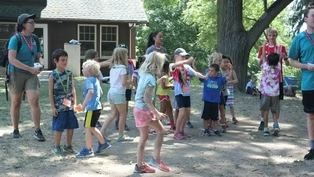
Wayne State University creates AI for Mobility Project
Clip: Season 8 Episode 39 | 5m 14sVideo has Closed Captions
Wayne State University seeks to improve Detroit’s public transit system with AI.
The Wayne State University School of Computer Science is working on an AI tool that may transform the way Detroiters get around the city. The goal of the tool is to increase the availability and reliability of Detroit’s public transit system. Producer Will Glover talks with Dr. Dongxiao Zhu, the founding director of the AI research initiative, and his team about their AI for Mobility Project.
Problems playing video? | Closed Captioning Feedback
Problems playing video? | Closed Captioning Feedback
One Detroit is a local public television program presented by Detroit PBS

Wayne State University creates AI for Mobility Project
Clip: Season 8 Episode 39 | 5m 14sVideo has Closed Captions
The Wayne State University School of Computer Science is working on an AI tool that may transform the way Detroiters get around the city. The goal of the tool is to increase the availability and reliability of Detroit’s public transit system. Producer Will Glover talks with Dr. Dongxiao Zhu, the founding director of the AI research initiative, and his team about their AI for Mobility Project.
Problems playing video? | Closed Captioning Feedback
How to Watch One Detroit
One Detroit is available to stream on pbs.org and the free PBS App, available on iPhone, Apple TV, Android TV, Android smartphones, Amazon Fire TV, Amazon Fire Tablet, Roku, Samsung Smart TV, and Vizio.
Providing Support for PBS.org
Learn Moreabout PBS online sponsorship(upbeat music) Over the last few years, conversations around artificial intelligence or AI have grown.
From applications like ChatGPT writing just about anything you can think of to the recently showcased Sora that generates video from text, the uses for AI seem to grow daily, and that includes here in Michigan, in Detroit, at the Wayne State Computer Science Building, I spoke with professor of computer science Dr. Dongxiao Zhu whose goal is to use AI for social good.
Can you explain in, I guess, the simplest terms, what artificial intelligence is?
What are we talking about?
- Yeah, artificial intelligence is a sub-discipline of computer science.
So it's basically just help people, human beings, how to use computer to promote the productivity.
Artificial intelligence is artificial, not real, just to mimic some of the human actions like decision making.
But second is general intelligence, just behave, hopefully behave completely like a human.
- What are some of the AI applications that people have been using but may not realize it is indeed artificial intelligence?
- For example, you can use AI to schedule a meeting for you.
The companies can use the conversation agent to do the entry level customer service in the medical field so the AI can help to diagnosis and also prognosis.
Based on the images, the AI can automate the process to predict or whether there's a certain condition exist.
- Today, we hear mostly about the second generation of AI differentiated by its ability to think past simple yes or no decisions and complete tasks like summarizing entire books, generating creative works like images and video, or administrative paperwork based on what the user asks, which for today's workforce, can be both inspiring and frightening.
- Instead of being afraid of AI to take a job from the people, we should take it more positively, we should start thinking about how to use AI to help us, to promote the productivity and improving the outcomes.
- [Will] In response to a Civic Innovation Challenge award by the National Science Foundation and Department of Energy, Dr. Xhu and his team are developing an AI tool to improve public transit operations and options for Detroiters.
The efficiency and accessibility of public transit, sometimes referred to as mobility, plays a critical role in moving people around Detroit.
- So in this case, I mean, mobility is one of the primary interests from public, right?
So how to move freely and safely, right?
Especially for the people with disabilities.
- [Will] The AI tool would enable the Detroit Public Transit Service to accommodate writers' needs by adjusting bus routes more.
It would also improve the availability of on-demand rides known as microtransit and paratransit rides for people with disabilities more effectively.
The AI tool would use foot traffic data to see where most people need and use public transit combined with information through an app to make sure more buses and rides are available and on time.
Rafi Ibn Sultan on Dr. Xhu's team shows us how the AI tool would also improve rider's ability to navigate what's called the last mile, which is the distance a rider has to travel to their destination after they've been dropped off by creating a detailed map of sidewalks using aerial images from sources like Google.
- What if people, they are to have like disabilities?
So they need like a pedestrian networks, like where the sidewalks are, where the crosswalks are, how I can cross the street.
- [Will] When we contacted the Detroit Department of Transportation, they said it's too early to comment on potential AI solutions to current transit needs.
While the current app does show where buses are and gives estimated arrivals, it doesn't help them run on time or make other transit options more readily available.
- So the AI play a role here to determine when and where to deploy these resources to move the people to where they want to go.
- [Will] AI technology is still an emerging field with new developments and potential applications cropping up daily.
- Well, obviously it's exciting, like we're in the front seat of a car which is going to the future, right?
So we're actually working on something that is being developed like every day.
If you go in the research community, you'll say like 10 or 15 papers per day because everybody's working on it.
- [Will] AI-enhanced public transit would be a game changer that has the potential to push Detroit further into the future.
AI for mobility is just one area of Dr. Xhu's research, and it's still in the prototype stage, but overall, he's cautiously optimistic about the future.
- My optimistic estimate is next five years, we can fully realize the AGI, artificial general intelligence.
So that means AI can behave exactly like a human being in terms of any many things, not anything, may things.
One Detroit Weekend: March 29, 2024
Video has Closed Captions
Clip: S8 Ep39 | 2m 11s | Celebrate Easter Sunday, the start of spring and more around metro Detroit this weekend. (2m 11s)
Republicans, Democrats vie for open Michigan senate seat
Video has Closed Captions
Clip: S8 Ep39 | 9m 10s | Republicans and Democrats in a tight race for Michigan’s open Senate seat. (9m 10s)
Two new operas close out Detroit Opera’s spring season
Video has Closed Captions
Clip: S8 Ep39 | 5m 9s | “Breaking the Waves,” “Cunning Little Vixen” closes out Detroit Opera’s spring season. (5m 9s)
Providing Support for PBS.org
Learn Moreabout PBS online sponsorship
- News and Public Affairs

Top journalists deliver compelling original analysis of the hour's headlines.

- News and Public Affairs

FRONTLINE is investigative journalism that questions, explains and changes our world.












Support for PBS provided by:
One Detroit is a local public television program presented by Detroit PBS


